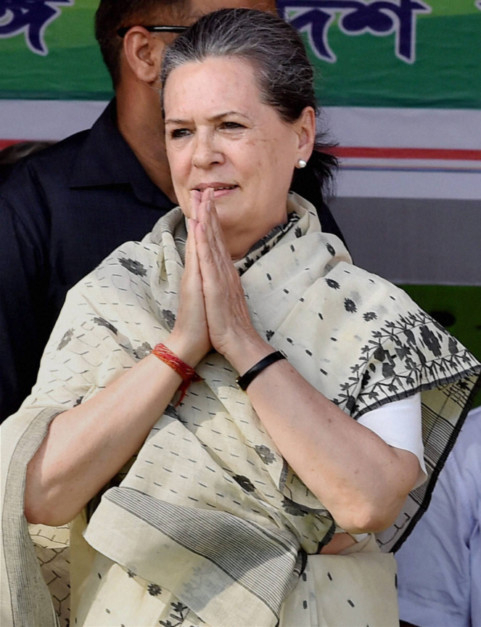
India’s botched AgustaWestland helicopter deal continues to make headlines — and for all the wrong reasons!
Quite like the Bofors scandal in the late 1980s, that turned out to be such a huge embarrassment for Rajiv Gandhi, the then prime minister of India, ‘Choppergate’ has all the forebodings to emerge as a nightmare for Congress president and Rajiv’s widow Sonia Gandhi, who has been mentioned as the “main driving force” for the AgustaWestland deal in a 225-page judgement by the Milan Court of Appeals. Apart from Sonia, the notes cited by the court also mention several top Congress party functionaries, key among them being one ‘AP’, widely believed to be Ahmad Patel — Sonia’s political secretary. The Milan court has overturned a lower court’s order and sentenced Giuseppe Orsi, the former chief of Finmeccanica, the parent company that owns AgustaWestland, to four-and-a-half years in jail, and Bruno Spagnolini, the former CEO of AgustaWestland, to four years behind bars over bribery charges involving India’s proposed purchase of 12 choppers to ferry high-security VVIPs, such as the president and the prime minister.
The issue first came to light in 2013, when it was reported by a section of the Italian media that bribes to the tune of €51 million (Dh248.3 million) had been paid to clinch the deal for the purchase by New Delhi of 12 AW-101 helicopters for an estimated $610 million (Dh2.24 billion).
On February 12, 2013, Italian authorities had arrested Orsi on charges of giving bribes to help clinch the helicopter deal with India. The very next day, A.K. Anthony, the then defence minister of India, ordered a probe under the Central Bureau of Investigation (CBI) into the alleged payoffs, which subsequently led to the scrapping of the entire deal by New Delhi.
An Op-ed piece appearing in Gulf News on August 20, 2013, had cited a castigating report by the Comptroller and Auditor General’s (CAG) office in India over financial and procedural irregularities in the AgustaWestland deal. The CAG report had questioned the role played by the Prime Minister’s Office (PMO), the then national security adviser (NSA), M.K. Narayanan, and two former Air Chief Marshals — Fali Homi Major and S.P. Tyagi — in tweaking certain key parameters of the operational requirements of the helicopters. According to the CAG report, the stipulated altitude requirement of 6,000 metres was reduced to 4,500 metres while the Ministry of Defence, at the behest of the PMO and in keeping with instructions from the NSA, mandated that the VVIP helicopters ought to have a minimum cabin height of 1.8 metres — a stipulation that saw AgustaWestland emerge as the lone vendor.
Serious security breach
The Congress-led United Progressive Alliance (UPA) government was in power for almost a year since ordering a CBI probe, but nothing concrete transpired during those months and not a single arrest was made, though many believe, and quite rightly so, that the CBI ought to have closely tracked the money trail and fixed accountability. More so, since the names of serving chiefs-of-staff were involved in the allegations. Among them, Tyagi’s role was particularly contentious since it was reported that one of his cousins was actively involved as a middleman in the AgustaWestland deal. If that was indeed the case, then it could have resulted in a serious breach of protocol and the country’s security could have been compromised since, under no circumstances, is it acceptable for a serving chief-of-staff to be so closely associated with a defence deal where one or more of his or her family members are conduits and/or facilitators.
While the then UPA government will have a lot of explaining to do with regard to dragging its feet on the probe, the entire episode also leaves the current Bharatiya Janata Party (BJP)-led dispensation at the Centre red-faced. Even almost three years after coming to power, the BJP government has shown a surprising disinterest in going after the leads. A section of political analysts believe that Tyagi’s close association with a social organisation called Vivekananda Foundation could be one of the reasons why the BJP preferred not to go full-steam ahead with the probe. Vivekananda Foundation is known for its leanings towards the BJP and going after Tyagi could have thrown up a few uneasy truths for the party. But the citing of Sonia as the “main driving force” behind the chopper deal and the likely allusion to key Congress leader Patel and a few other influential Congressmen in the Milan court’s verdict were windfalls the BJP couldn’t have ignored, neither inside nor outside the parliament.
Be that as it may, the Italian authorities have at least shown their sincerity of purpose by bringing the bribe-givers to book. But the question is: Will the Indian government be as responsive in fixing accountability and bringing the bribe-takers to book? Will Sonia be more forthright in offering a fact-based rebuttal of the allegations and the alleged role of some of her party colleagues in the murky deal?
The plot has just started unravelling. Keep watching!
You can follow Sanjib Kumar Das on Twitter at www.twitter.com/@moumiayush.










